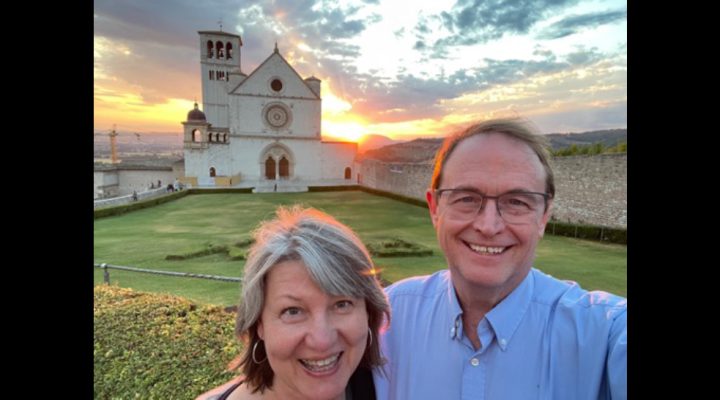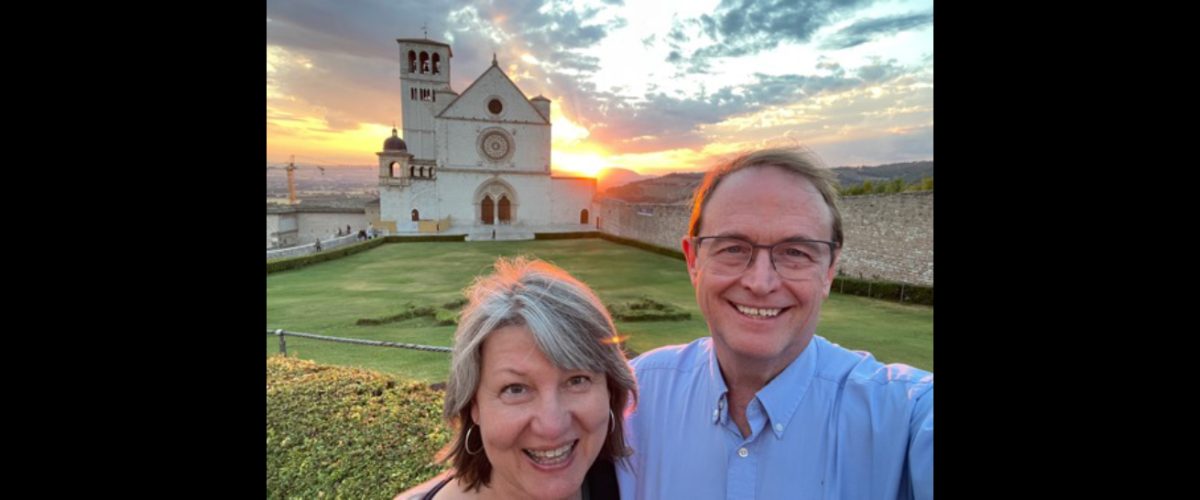Last week, Carol and I joined the 4 to 5 million pilgrims who will make their way this year to Assisi, Italy, the cradle of Franciscan spirituality, to walk in the footsteps of St. Francis and buy sacred refrigerator magnets.
We saw the place where, according to tradition, Francis was, coincidentally, born in a stable just like Jesus. We stood at the baptismal font where Francis’ mother prayed Francis would stop crying. We walked through Francis’ childhood home and knew where the washer and dryer should go.
At the cell where he imprisoned his son in a misguided attempt at tough love, we were embarrassed for Francis’ father. At the square where Francis confronted his father and took off his clothes, I wondered how many tourists have had too much wine and felt inspired to get naked in the same spot.
The faithful have been listening for 800 years to the crucifix of San Damiano that told Francis to “Go and repair my church, which is falling into ruin.” For most, it has been silent.

One of many St. Francis-themed souvenir shops.
We did not buy any St. Francis jewelry, comic books or key rings. We thought it odd to pay €40.00 for a stylish T-shirt adorned with the name of someone who only wore what Goodwill would not take, but Francis memorabilia has a long history. The donkey that brought Francis’ dead body back to Assisi for burial died because people pulled out the donkey’s hair for souvenirs.
The Basilica of St. Francis is an ornate church built over the tomb of a saint who slept outdoors. Our agnostic guide explained: “This is not a Franciscan church, because Francis believed in poverty. We forgive the church, because it is beautiful.”
While we looked like tourists on vacation, I can now see how I was following in the steps of Francis. My experiences with the Franciscan vows — poverty, obedience, chastity — are uncannily like Francis’.
The first Franciscans lived in abject poverty, ate wild turnips and worked odd jobs for alms. We had dinner our first night at La Laterna Ristorante, where the waiter asked, “Was that the best pizza you ever ate?”
I said, “I’m from New York, so my standards are pretty high.”
He is still rolling his eyes.
Before our trip began, I figured out which credit card would give us the most rewards. Somewhere between the margherita pizza and our room I lost my fancy travel card. I had to cancel my credit card and use a debit card that adds 3% to every international purchase. I was following in Francis’ footsteps. Losing my credit card felt almost exactly like what Francis felt when he rejected his father’s wealth.
The second Franciscan vow is obedience, the decision to give up power. On our last rainy night in Assisi the power went out. My mind started racing: “How hot will it get without air conditioning? What will happen if our phones run out of charge and we can’t get to our train tickets? How will we even call the taxi to get to the train?” My experience of losing power was what Francis felt when he visited Pope Innocent III in 1209 to ask to form a new order. Francis did not have power, just like we did not have power. Fortunately for us, the power came back on after five minutes.

The bed of St. Francis
The third vow, chastity, is the promise to refrain from sex as a way of caring for everyone. The Franciscans slept in caves and embraced lepers, which made this easier. My plan was to go a different direction. Like the romantics we are, we made reservations for a “double” at a convent, Suore Francescane Missionarie di Assisi. You might think that “double” indicates a double bed, but you would be underestimating the Franciscan commitment to chastity. Twin beds help pilgrims replicate the feeling of sleeping in St. Francis’ cave. As I laid there four feet from my beloved, I thought, “This is what Francis felt when he slept with only a rock for a pillow and when he saw Saint Clare from a distance.”
Cynical readers might think that my experiences do not completely parallel Franciscan vows and that losing your credit card is not the same as receiving the stigmata. They would have a point.
I don’t pray, write or love like Francis did. Like other Christians, I struggle with my lack of resemblance to the saints. We have homes, jobs and IRAs, but Francis would not look down on everyone with a credit card. Francis told his followers not to criticize those whose commitments to Christ did not look like their own.
My spiritual director, a Franciscan friar, has directed me to read eight books on Francis. Each of the eight made me feel shallow, but Father Joseph says: “Franciscans follow, admire and love Francis, but we sleep in comfortable beds, eat healthy and enjoy air conditioning. We follow Francis by caring for the poor, listening to the left out and defending creation.”
The Franciscan order grew quickly not because people were tired of soft beds, but because they wanted the joy with which Francis lived. Spirituality is not denying what is good but practicing what is better.
If we want to follow Francis, we should not start by sleeping on rocks, but by asking, “Who needs what I have? Who could use a listening ear? How can I care for someone who’s broken?”
The words “poverty,” “obedience” and “chastity” sound negative, because a lack of money, freedom and intimacy can be painful. Franciscans, however, recognize their vows are gifts that lead to joy. Poverty is freeing, obedience is serving, and chastity is loving others like family.
Francis is right: “For it is in giving that we receive.”
Brett Younger serves as senior minister at Plymouth Church in Brooklyn, N.Y.


